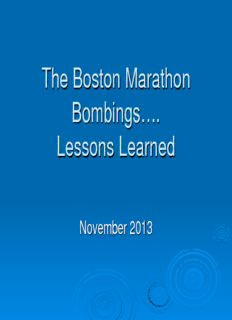
Alasdair Conn Buffalo Talk PDF
Preview Alasdair Conn Buffalo Talk
The Boston Marathon Bombings…. Lessons Learned November 2013 Agenda for the Presentation Background of Health Care organizations within Eastern Massachusetts. Background on the MGH. Disaster planning in metro-Boston. Events of Marathon Monday and beyond. Lessons Learned……… Massachusetts Health Care Organization Massachusetts has a very strong city and town organizational structure, counties are weak. There are 296 towns and 55 cities in Massachusetts. EMS is provided by the cities and towns, in Boston EMS is a third service, in other jurisdictions it varies but usually basic EMT are within Fire and ALS is contracted out. Hospitals are transitioning into networks which are fiercely competitive. The Massachusetts Hospital Association and COBTH. The Boston Hospitals and COBTH Boston has many major medical facilities. Three medical schools. Five adult Level 1 trauma centers and three level 1 pediatric trauma centers. Two level 1 adult burn centers and one (Shriner’s supported) level 1 pediatric burn center. The Council of Boston Teaching Hospitals (COBTH) has a coordinating function. Disaster response and EMS oversight has been traditionally very collaborative. Regular meetings of EMS and Disaster sub-committees monthly. Map Partners Healthcare Massachusetts General Hospital 1050 beds 48,493 inpatient admissions 3,699 births 41,304 surgical operations 102,300 Emergency visits 1.6M outpatient visits $776M annual research budget 24,510 employees Harvard Medical School affiliated Level 1 trauma and burn center, adult and pediatric Data from fiscal year 2012 September 11th 2001. World Trade Center New York City. Boston was informed that approximately 40 critical patients were going to be evacuated by train to Boston hospitals. All major facilities activated their disaster plans – which were never needed. Following the incident many hospitals – including the MGH – realized that disaster plans were wanting. Total revision of plans incorporating the Hospital Incident Command System. (HICS) H.I.C.S. Clear delineation of command structure based upon the model of fire fighting structure. Incident Commander, Liaison officer, Security Officer, Public Information Officer, Compliance Officer. Ensures that Operations, Planning, Logistics and Finance are all managed. MGH – and other Partners Hospitals – all underwent the modifications and training required. Disaster plans modified accordingly. Hospital Incident Command System HICS is designed to: Be usable for managing emergency or planned events, of any size or type, by establishing a clear and efficient chain of command/reporting structure Allow personnel from different agencies or departments to be integrated into a common structure that can effectively address issues and delegate responsibilities Provide needed logistical and administrative support to operational personnel Ensure key functions are covered and eliminate duplication 10 MGH Emergency Preparedness
Description: